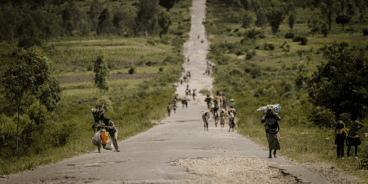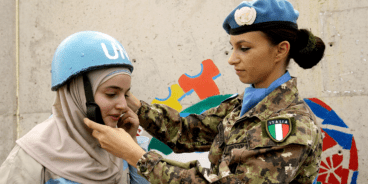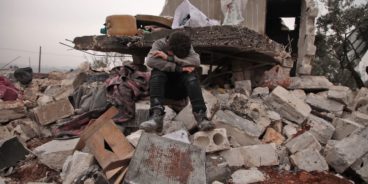
Statement on the International Day of UN Peacekeepers, 2015
Today, 29 May 2015, marks the International Day of United Nations Peacekeepers. The Global Centre for the Responsibility to Protect pays tribute to UN peacekeepers deployed around the world and recognizes the sacrifice of those who lost their lives in the service of peace and the protection of civilians. Forty-nine UN peacekeepers have died so far during 2015. Attacks against peacekeepers constitute war crimes and we commend the fortitude of UN peacekeepers who help maintain international peace and security.
As we recognize the International Day of United Nations Peacekeepers – and the 10th anniversary of the global commitment to the Responsibility to Protect later this year– we recall that ten out of sixteen current UN peacekeeping missions have Protection of Civilians mandates, which involve more than 95 percent of all UN peacekeepers. Peacekeepers are also increasingly called upon to uphold the international community’s Responsibility to Protect civilians from mass atrocity crimes, namely genocide, war crimes, ethnic cleansing and crimes against humanity.
UN peacekeeping missions assist states in upholding their primary Responsibility to Protect, as UNMISS is mandated to do in South Sudan. As the civil war flared in that country, the decision to “open the gates” of UNMISS bases saved thousands of lives and was in keeping with the UN Secretary-General’s Human Rights Up Front initiative. UN peacekeepers are also on the frontlines protecting civilians from mass atrocity crimes when states are unable to do so, as with MINUSCA in the Central African Republic and MONUSCO in the Democratic Republic of the Congo. Meanwhile, in Sudan the government is obstructing one of the world’s largest peacekeeping operations, UNAMID, leaving civilians in Darfur inadequately protected from ongoing crimes against humanity.
We welcome the High-Level Independent Review Panel on UN Peace Operations and look forward to practical recommendations on how to close the gap between increasingly complex mandates and operational under-resourcing. Training modules should be instituted for UN personnel to provide them with a better understanding of early warning indicators of mass atrocity crimes. The new Framework of Analysis for Atrocity Crimes by the UN Office on Genocide Prevention and the Responsibility to Protect is an important tool that should be mainstreamed into operational planning and the day-to-day work of UN peacekeeping missions.
Resource mobilization is a critical issue. UN peacekeepers must be appropriately equipped to protect civilians from the diverse threats they face. The imbalance among UN Member State financial and troop contributions must also be addressed. The top five current troop contributors to UN peacekeeping are all developing countries. The developed world needs to re-engage and meaningfully expand its support for peacekeeping operations.
This July the world will commemorate the 20th anniversary of the genocide in Srebrenica, Bosnia and Herzegovina, where UN peacekeepers manifestly failed to protect civilians facing the imminent threat of death. Srebrenica was a defining moment that directly contributed to the global agreement on the Responsibility to Protect in 2005. Our collective efforts to learn from the past must be coupled with a practical determination to ensure that all UN peacekeepers are better prepared to protect civilians from mass atrocity crimes today.
Related Content


Statement on the International Day of UN Peacekeepers, 2021
